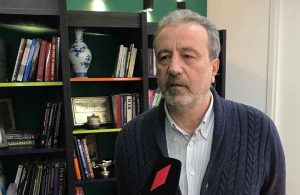Will the EU suspend aid to Georgia? Expert analysis
Conflict between Georgian opposition and authorities, analysis
A number of independent Georgian experts say the country “has taken another step into a political dead end. The threat for the country to find itself in the Russian orbit instead of the European one is growing rapidly.”
After several failed attempts by high-ranking European mediators to bring the opposition and the authorities in Georgia to an agreement, the European Parliament has started talking about the possibility of imposing financial sanctions on the country.
On April 1, seven influential MEPs published a letter stating that Georgia may not receive 60 million euros in October 2021. This is part of a package of 1.5 billion lari allocated by the European Union to Georgia in the context of the COVID-19 pandemic.
The MPs who signed the letter blamed the government for the failure of the talks. However, they emphasize that a large share of the responsibility for this lies with the opposition as well.
In the first comments, the majority of representatives of both the opposition and the authorities again blamed each other on the responsibility. Several officials also said that the message actually indicated only the position of several MEPs, and not the entire European Union.
However, experts and political observers are almost unanimous in saying that they cannot recall such a harsh tone from the EU since the Shevardnadze era.
The letter is an alarming political signal for Georgia that the country has crossed the “red line”.
JAMnews spoke with several Georgian and foreign experts on this topic.
Hans Gutbrod, professor at Ilia University in Tbilisi

“The letter from the MEPs is another step into the political deadlock in Georgia. It is very important to understand exactly what this means. This is a warning from leading and influential MEPs – but at the same time, there is still no reaction from Georgia. These are not sanctions, but this is a condition for the future. help.
Given the difficult economic situation in Georgia, the impending third wave of the pandemic and uncertainty about the income of tourists, such assistance is urgently needed for Georgia. It is also needed to prevent further currency devaluation.
But at the same time, it is also a sign that there is an absolute need to get out of the impasse of confrontation. This cannot be postponed. The country needs a government that can and will deal with important problems.”
- European Parliament ‘disappointed’, proposes suspending financial aid to Georgia
- Food prices rise sharply in Georgia on back of high inflation
Oliver Reisner, Ph.D., professor specializing in Caucasian and European Studies

“The fact that the European Union had to intervene and help Georgia resolve internal political issues speaks volumes.
The statement of the MEPs is primarily of political significance. This is a harsh criticism of both sides, both the government and the opposition.
It is important to understand that the seven MEPs who signed the letter belong to different political factions. This is far from only the European People’s Party, which is known to be more supportive of the United National Movement [the leading opposition force in Georgia, which is associated with ex-President Mikheil Saakashvili].
This is a very serious contextual warning that such an approach is impossible if the country really wants to join the European Union.
I believe that the situation in Georgia is actually very difficult. Both sides must change their positions and rhetoric. They look at each other as enemies, and try to divide the population according to this principle. This approach was in Stalin’s times. This needs to be changed; a political rival is a competitor, not an enemy.
Also, the population should be involved in the political process, people should take on part of the responsibility. I do not see such an approach from either side. They only fight with each other to gain control over state resources.
Meanwhile, society does not live at all according to groups of political interests, and does not divide according to its attention to one or another politician. Both governments and the opposition only make populist promises during elections, but act with authoritarian approaches.
This is the result of the hybrid regime – no real steps are taken to move towards democracy. “
- Politicised justice, attack on media, electoral violations – Georgia in US State Department report
- Protests resume after work picks up on disputed hydro station in west Georgia
Kakha Gogolashvili, Director of the Center for European Studies of the Rondeli Foundation, former head of the Georgian diplomatic mission to the European Union:

“It is very bad when such a statement is made by the most friendly MEPs in relation to Georgia.
Yes, there are only seven of them, but they all hold quite important positions in the European Parliament. And their requests are perfectly reasonable.
Let’s not forget that Georgia receives the most aid per capita from the European Union. I doubt that a decision will be made right now to suspend the next tranche of financial assistance. We are talking about an internal crisis in Georgia, but this does not mean that something similar has been done in Georgia to what, for example, Lukashenka did in Belarus. There are no violations of fundamental human rights and the like.
But if we want to apply for EU membership in 2024 and receive candidate status, or at least a hint that the EU is considering Georgia’s candidacy, we need to radically change the situation in the country.
What is happening now must end. The mutual intolerance of political parties must end. If this does not happen, Georgia will not be able to apply to join the European Union. Therefore, it is extremely important that all political forces manage to push their party interests into the background. They must understand that we have no other choice. “
David Aprasidze, Doctor of Political Science, Professor at Ilia University:

“This letter is both good and bad for the country. It is good that there is a feeling that we are not alone, and Europe cares about the fate of Georgia. But it is very bad how it became clear how irresponsible politicians in this country are.
Political groups link the fate of the country only with their own destiny. Compromise, political consent are acceptable to them only if they themselves are at the head of the government. This applies to all players.
How can anyone advocate for the imposition of sanctions against the country? But I, unfortunately, do not see any other solution. The desired result, of course, is that both the opposition and the government come to their senses. But if not, in the conditions of this political aggravation, we can really find ourselves in the orbit of Russia, which will be the final death for Georgia.
I continue to hope that Georgia is so important to the West that we will achieve some results with the help of semi-coercive methods on their part. “
- Georgian opposition to request termination of parliamentary mandates on legislature’s first day at work
- Op-ed: can the Georgian opposition and gov’t overcome the political standoff?
Vano Chkhikvadze, Head of the European Integration Program:

“The letter of the MEPs has, first of all, political significance. The comments of the authorities that this statement is made by only seven people are very frivolous.
For the first time, it is said that relations between Georgia and the European Union are at stake. This should be well thought out by our politicians. This applies to everyone, despite the fact that the authorities always have more responsibility.
Everyone should understand that there is a danger of returning to Russian orbit. And everyone is responsible for this. This statement is a warning, a request to correct the situation so that this does not happen.
As for the financial part, a total loss of 75 million euros will be a severe blow to the economy and financial stability of Georgia. “


















